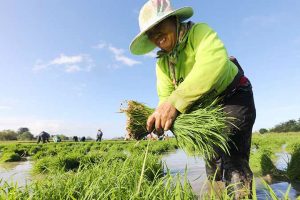By Beatriz Marie D. Cruz, Reporter
THE GOVERNMENT must extend the life of the Rice Competitiveness Enhancement Fund (RCEF) while adding programs promoting the use of hybrid seed to enhance productivity, analysts said.
“We support the move to extend RCEF given that it has clearly not achieved its objective of enhancing the competitiveness of rice farmers vis-à-vis imports and ensuring their profitability following the liberalization of the rice market,” Federation of Free Farmers National Manager Raul Q. Montemayor said in a Viber message.
Monetary Board member V. Bruce J. Tolentino also backed an RCEF extension and cited the need to fund and distribute hybrid seed.
“Over the past few years, the Philippines has been reaping record rice harvests. Fundamentally this is because of the increased access by farmers to good seed, distributed by PhilRice (Philippine Rice Research Institute) and funded by RCEF,” he said in a Viber message.
“This is very important to continue and even expand the seed development, improvement, and distribution program under RCEF,” he added.
On Monday, the Department of Agriculture (DA) will present to the House of Representatives Agriculture and Food panel its status report on the implementation of Republic Act No. 11203 or the Rice Tariffication Law of 2019, committee chairman and Quezon Rep. Wilfrido Mark M. Enverga said.
“We have requested a complete briefing on the efficacy of the law and the RCEF program five years running,” Mr. Enverga said in a Viber chat.
RCEF receives P10 billion a year from rice import tariffs as a component of the Rice Tariffication Act, which liberalized rice imports but made traders pay tariffs on their rice shipments.
RCEF supports the distribution of machinery, seed, credit, and fertilizer for a six-year period. RCEF is set to expire in June.
“Improved yields not only increase production and domestic supply, but also decrease farm production costs and improve farmer incomes, enabling farmers to be more competitive with Vietnam or Thailand,” Mr. Tolentino said.
University of Asia and the Pacific Senior Economist Cid L. Terosa said a review of the RCEF would help determine the “best use” of the funding.
“The RCEF has achieved some gains, but, in my opinion, much can still be done to maximize benefits from it,” he said in an e-mail.
In its review, policymakers should look into RCEF as an “additional funding source for the whole DA rice program,” and not a “separate program.”
“RCEF funds should logically be coursed through the DA instead of being released directly to implementing agencies, to ensure that RCEF programs complement and do not duplicate or compete with DA rice program activities,” Mr. Montemayor said.
He also expressed skepticism about the “pre-allocation” of funds for farming activities, which is “based on what legislators think farmers need and not what farmers think they need for themselves.”
Last week, the National Economic and Development Authority backed a “well-targeted” RCEF, amid President Ferdinand R. Marcos, Jr.’s call to reduce unnecessary barriers to agricultural imports.
